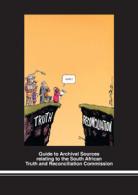"We have looked the beast in the eye. Our past will no longer keep us hostage."
- Archbishop Desmond Tutu
The first day of Truth and Reconciliation Commission (TRC) hearings related to human rights violations took place on 15 April 1996 at the East London City Hall. The seventeen-member commission was headed by Archbishop Desmond Tutu. The commission had been enacted by the Promotion of National Unity and Reconciliation Act No 34 of 1995, giving South Africans the opportunity to confront the extreme and gratuitous acts of violence, brutality and inhumanity that took place under apartheid. During the TRC's existence, the commission would be faced with approximately 21 000 testimonies from both victims and perpetrators of political crimes. The first hearings set the tone for the hearings to follow, with even Tutu breaking down during one victim's testimony.
SAHA products, projects and collections related to the TRC
Reflecting an ongoing commitment to the process of transitional justice envisioned by the TRC, as well as the significance of the TRC in accessing information otherwise obscured by the previous political regime, SAHA has accumulated a large number of collections related to the TRC.
The TRC archival project
Conducted from 2003 - 2006, this joint archival initiative by SAHA and Historical Papers at the University of the Witwatersrand, funded by The Atlantic Philanthropies, aimed at identifying, preserving and promoting public access to the TRC archive, and producing:
- A Guide To Archival Sources Relating To The South African Truth And Reconciliation Commission identifying where in South Africa various TRC collections are located, and describing these collections;
- A Select Bibliography To The South African Truth And Reconciliation Commission identifying key published articles, books and book chapters, theses, online and audiovisual resources about the TRC, from conception to aftermath;
- The TRC Oral History Project (AL2985), featuring interviews with 63 individuals who worked for the Commission in various capacities and in different locales;
- The TRACES OF TRUTH website, featuring digitised copies of key archival materials relating to the TRC housed at SAHA and Historical Papers. These materials are organised into five broad categories - background, human rights violations, amnesty, reparations, and aftermath, with accompanying narrative, in an attempt to contextualise, compare and contrast these archival fragments.
- The addition of new collections relating to the TRC to both SAHA and Historical Papers' archives;
Visit SAHA's TRC Collections
TRC Special Report Multimedia Project
Between 1996 and 1998 the TRC Special Report was broadcast weekly, reporting on the different aspects of the public TRC hearings taking place across South Africa. SAHA is in the process of finalizing a unique resource aimed at making the work of the TRC even more accessible.
Learn more about the TRC Special Report Multimedia Project.
Paper Wars
The second chapter of Paper Wars, written by Piers Pigou, is dedicated to the relationship between freedom of information and the TRC. It is entitled 'Accessing the Records of the Truth and Reconciliation Commission'. The collection was edited by Kate Allan, SAHA's FOIP coordinator between 2005 and 2007, and published in 2009 by Wits University Press.
Learn more about Paper Wars.
![The truth hurts, but silence kills Poster advertising the TRC [SAHA Poster Collection, AL2446_4835]](/resources/images/CollectionItems/AL2446_4835.jpg)
Original poster of the Truth and Reconciliation Commission [SAHA Original Poster Collection :: AL2446_4835]





![The truth hurts, but silence kills Poster advertising the TRC [SAHA Poster Collection, AL2446_4835]](/resources/images/CollectionItems/AL2446_4835.jpg)


